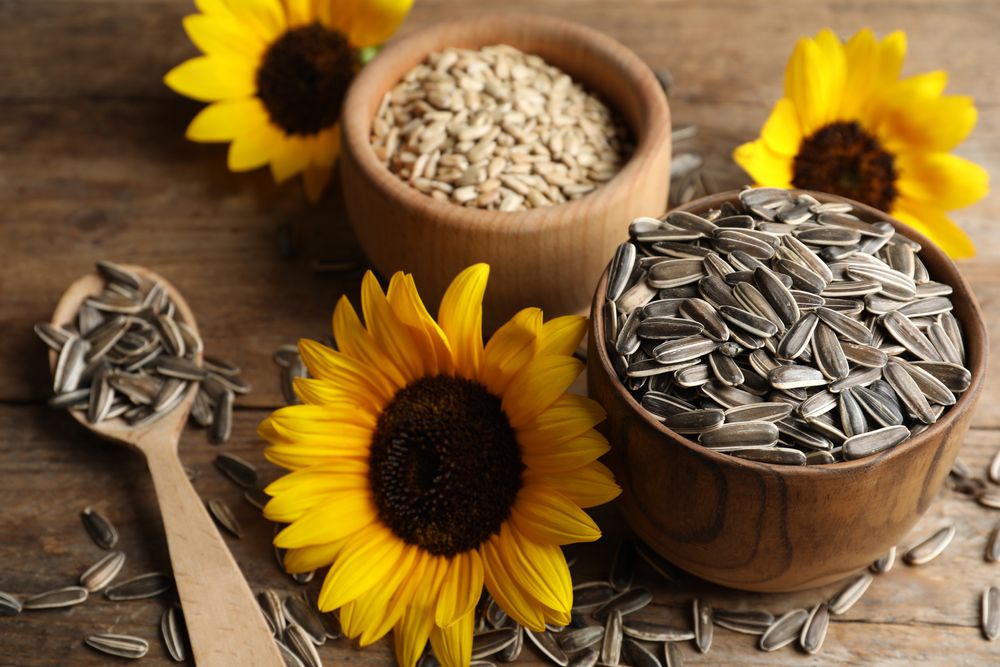Being a wholesome and delicious snack, sunflower seeds have gained worldwide renown. Although they may seem insignificant, sunflower seeds are a good choice for pregnant women to eat because they have all the extra nutrients they require. You must have been wondering if eating sunflower seeds while pregnant is safe. or “Are sunflower seeds detrimental to the brain development of your newborn baby?”
As a result, before utilizing sunflower seeds, you should be informed of any potential benefits, drawbacks, and applications.
Sunflower Seeds: What Are They?
The sunflower (Helianthus annuus) itself serves as the true seed of the plant. Linoleic, high-oleic, and sunflower oil seeds are among the several types of sunflower seeds. There are three different kinds of each type of fat: monounsaturated fats, saturated fats, and polyunsaturated fats.
Can A Pregnant Woman Eat Sunflower Seeds?
For both their own health and the health of their unborn child, pregnant women must be extra careful when it comes to their diets. Mainly, sunflower seeds are a great source of folic acid, which is necessary for a healthy pregnancy. Because they contain a lot of fiber and have positive effects on the digestive system, nuts and seeds are beneficial.
Because they contain Omega-3 fatty acids, which are crucial for the growth of the brain and nervous system in infants, nuts and seeds may be advantageous during the early stages of a baby’s development of both.
A great way to keep yourself full between meals is to snack on nuts and seeds like almonds, walnuts, or sunflower seeds.
Nutritional Information for Sunflower Seeds
Regular consumption of sunflower seeds may protect against long-term health problems like heart disease and Type 2 diabetes because they contain vital plant chemicals like vitamin E and selenium.
Nutrient information
Sunflower seeds include 163 calories and 14–15 grams of fat. Sunflower seed consumption during pregnancy: health benefits
Sunflower seeds are now required to be consumed by expectant mothers. For more information about eating sunflower seeds while pregnant, read on:
7 Benefits of Consuming Sunflower Seeds During Pregnancy
- An abundance of vitamins and minerals
More than 90% of the vitamins, proteins, and other elements that are included in the typical human diet are thought to be present in sunflower seeds.
- Prevents Extreme Changes in the Body
A number of minerals can be found in roasted sunflower seeds, including vitamin E, an antioxidant that protects the body from free radical damage.
- It helps to keep blood clots at bay
This vitamin works well to stop blood clots from forming in the veins.
- Phosphorous is present
Sunflower seeds are a good source of phosphorus and other minerals that are good for the bones of both you and your unborn child.
- Controls Blood Pressure
Potassium, which is essential to this process, maintains an equilibrium between the sodium-to-potassium ratio. A healthy blood pressure level is preserved as a result.
- Boosts Immune System
The anti-infective phytochemicals in seeds help you maintain a healthy immune system while you’re pregnant, which makes it easier for your body to accept the developing baby.
- Guards against heart diseases
Sunflower seeds may aid in the improvement of cardiorespiratory fitness as well as the prevention and treatment of the disease.
Sunflower Seeds During Pregnancy: Hazards
Sunflower seeds are indeed a rich source of protein. But how are sunflower seeds harmful to unborn babies? The negative consequences of eating sunflower seeds throughout pregnancy are listed below.
Allergies:
Sunflower seeds are an allergen for a great many individuals. Pollen from sunflower seeds or bird food containing sunflower seeds may be present when sunflowers are harvested. There might be allergic responses in certain customers as a result of this.
Sunflower sprouting increases the amount of free amino acids and polyphenols in the seed, whereas conventional sprouting increases the number of anti-nutrients that impair seed digestion.
Pathogens:
Even if you purchase germinated seeds from a grocery store, it’s still possible that the sources are tainted with potentially dangerous pathogens that might grow into fatal plants. Certain types of sprouted grains have been connected to incidences of food poisoning.
Calorie-Heavy:
When included in a well-balanced diet, sunflower seeds can provide a wide range of health advantages. They each have 165 calories, so supper might still be heavy in calories.
When and how many sunflower seeds should a pregnant woman eat?
Sunflower sprouting increases the amount of free amino acids and polyphenols in the seed, whereas conventional sprouting increases the number of anti-nutrients that impair seed digestion.
A professional seed sprouting mix may be useful if you’d prefer not to do it yourself! Observe the guidelines for eating sunflower seeds while pregnant. Sunflower seeds can be served in the following ways as part of a healthy diet:
Omega-3 fatty acids are found in nuts and seeds, and they support a baby’s healthy brain and the development of the nervous system. Cook with wet sunflower seeds instead of dehydrating them.
Due to their high protein and nutrient content, sunflower seeds, almonds, and walnuts are excellent appetizers for between-meal meals. Include a cup of pumpkin seeds, walnuts, and almonds in your trail mix, salad, or breakfast cereal. You may consume sunflower seeds raw or roasted on a stovetop or in an oven.
Raw seeds are a portable, wholesome snacks that may be carried alone or combined with a trail mix. Using roasted or unroasted seeds, cereals, vegetables, and salads are frequently spiced. While baking bread or muffins, don’t forget to include seeds. You can quickly and simply turn entire sunflower seeds into sunflower seed butter by using a powerful blender.
What Can You Use Instead of Sunflower Seeds?
The following substitutions are acceptable in place of sunflower seeds:
- You might use pumpkin seeds in place of sunflower seeds. When making pumpkin seed butter or using them as a garnish for soups or salads, pumpkin seeds are adaptable and delectable.
- Almonds can also be substituted with pine nuts, which have a delicate flavor but are sometimes more costly.
- Some tasty alternatives for nibbling all day long are walnuts or hazelnuts.
- Pregnancy and sunflower seeds are both excellent alternatives. And anybody may consume these nutritious jewels raw, roasted, or sprouted.
References:
https://pubmed.ncbi.nlm.nih.gov/25772849/
https://nnc.gov.ph/regional-offices/mindana













